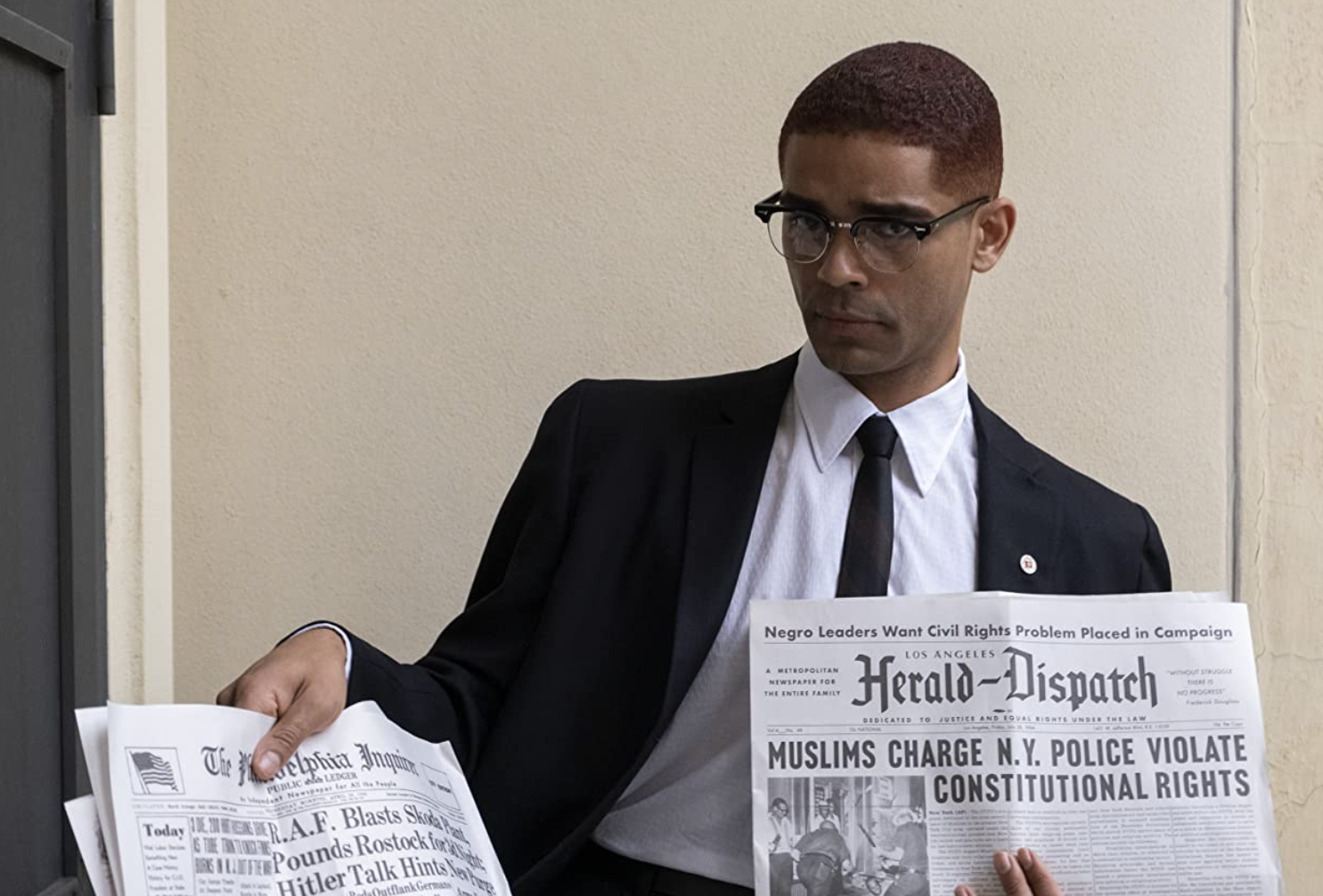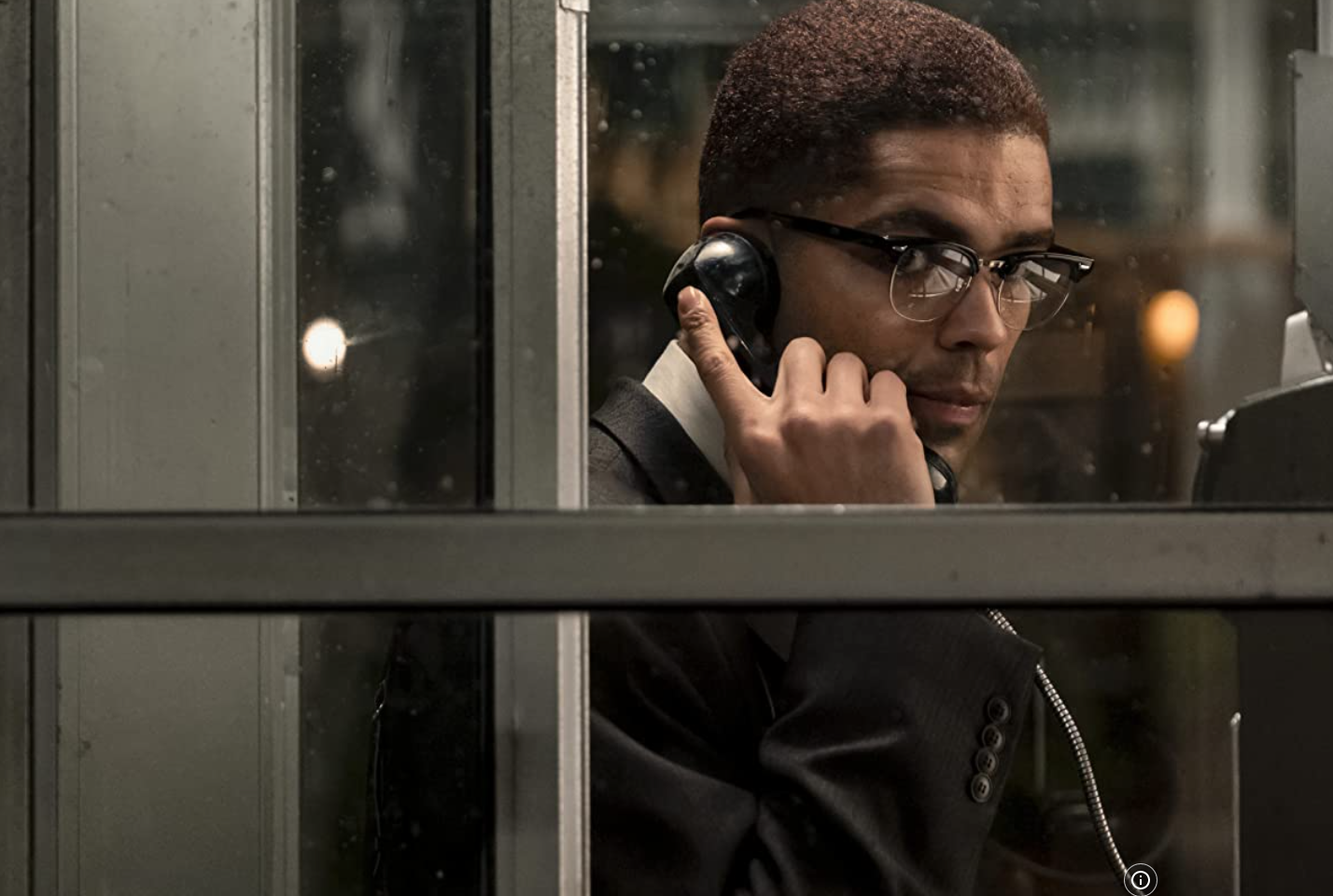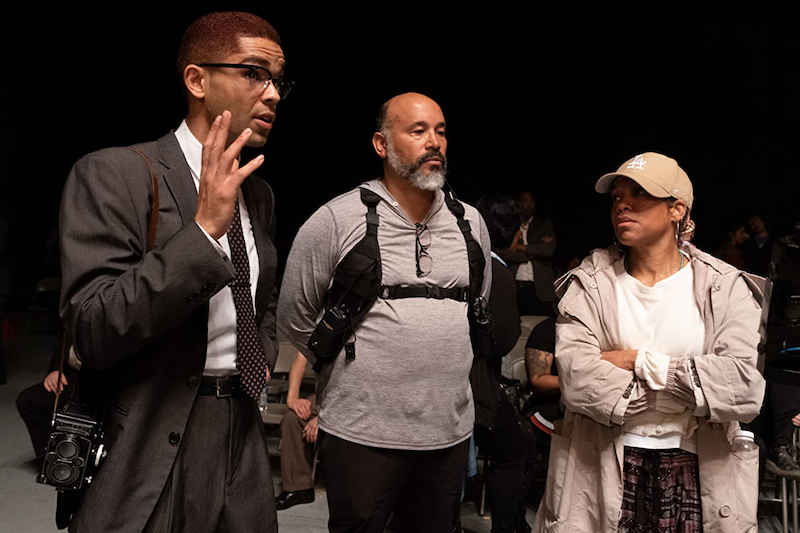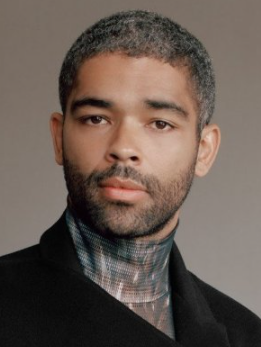Kingsley Ben-Adir is having a breakthrough year. In fact that’s the award he won at the Gothams on the same day I talked to him over zoom. He acknowledges that his performance in Regina King’s One Night in Miami is one that brought him more attention than any previous role. You may remember him as Zoë Kravitz’s ex- boyfriend in the short-lived Hulu series High Fidelity or from the Netflix series The OA. But it’s his performance as Malcolm X that’s being talked about this season for a possible best actor nomination at the Oscars.
One Night in Miami, adapted by Kemp Powers from his play, imagines a historic night in which four Black icons Cassius Clay (Eli Goree) before he changed his name to Muhammed Ali, Sam Cooke (Leslie Odom Jr.), Jim Brown (Aldis Hodge) and Malcom X (Ben-Adir), come together in a Miami motel room in 1964 and debate their roles as leaders and celebrities at that moment in the Civil Rights Movement. Malcolm X is the one who set up the meeting and the one who has an agenda that becomes apparent as the night goes on. He’s at the center of the film giving Ben-Adir a marvelous opportunity to showcase his talent.
[The following interview has been edited and condensed for clarity.]
Murtada Elfadl: This film lives and dies by the interplay between the four actors. Can you talk about your relationship on set with Aldis, Leslie and Eli? There is passion to the performances and I think you're feeding off of each other.
KINGSLEY BEN-ADIR: I think Regina very carefully hand-picked each of us. I chemistry tested with Leslie before I was cast...

So we, Regina and I, and Regina, Leslie, and I spent a few hours together in New York. Regina got a chance to see us together and we got a chance to have a conversation about a few moments in the film. I know Eli did the same with Aldis, they chemistry tested and they got together on the phone. I spoke to Addis on the phone for a number of hours before Regina cast me. So Regina was checking in with Aldis that he dug me. She made sure that we felt connected on some level. Then when we got there, we just went in and figured it out. We took a few days to warm up and work out what everyone was doing.
We started on some quite heavy moments. So in the first few days we were in the middle of the movie and I was laying into Sam and that was before Leslie and I knew each other. He spent a huge part of his first ten days just sitting there listening to me laying into him. I think that was kind of tricky because we hadn't shot the stuff at the beginning and we hadn't shot the stuff at the end. So it was in isolation, it kind of felt maybe a bit too much, but we just kept in constant dialogue about where we were at emotionally in terms of the character. There was a strong sense of concentration on making sure that the emotional map was at the center of our conversations.
Murtada Elfadl: To my mind the film takes Malcolm’s side in the arguments presented. Is that harder or easier to play?

KINGSLEY BEN-ADIR: It was probably, on some level, the reason why I responded to the script. Malcolm was the character when I read this that I wanted to play. Yeah you're right, maybe it does take Malcolm's side. What I love about this opportunity was that the emotional undercurrent of the piece really depends so much on what's going on in Malcolm's heart and mind at the time. And just as an acting challenge I thought that was just such a beautiful opportunity. This hero, this seemingly fearless man. And we get to tell a story about a moment in time where he may have felt fear. And to get to examine him as a human and as a man, just as a husband and a father was really interesting. I loved playing the emotional center of a Regina King directed independent feature film. That's something I've definitely dreamed about for many years, so it was cool.
Murtada Elfadl: And I'll come back to Regina. But first, if we're talking about Malcolm as a character. He is righteous, he's got convictions. What I liked about your performance is that it avoided being earnest about that. Was that something you thought about?
KINGSLEY BEN-ADIR: I think, there are a lot of misconceptions about Malcolm and the stereotypical image of him. I found out that he was actually one of the most hilarious human beings. He had such a brilliant sense of humor. And I found out that he was incredibly sensitive and kind and sweet and very popular behind the scenes in one-on-one situations with people. A lot of the time people will say he was just such a gentleman, and really good company and great to be in his presence. His friend Gregory said that he was kind and sweet and bashful. I was like come on, man, let's do this. Like this is so much more interesting than trying to pretend to be some sort of lacerating demagogue. The truth was that he had children, and his life was in danger. He must have felt scared and that's the reason why he's a hero. He felt scared, and he still faced it. That's why the hero is a hero because the stakes were really high. He could have run away but he didn't. He still stayed in Queens and put his life on the line and he died for Black people. He demanded respect from white America and he did not ask for it, and he put the fear of God in white America.To watch him in Harlem with the community was some of the most joyous moments of my preparation and research. I watched those black and white, I think 1961, archival footage of Malcolm in Harlem. Just talking. It's so wonderful, you really get to watch a genius at work.

Murtada Elfadl: You captured it well. And you talked about working with Regina. How was that different than other directors you've collaborated with? Her being an actor and such a great actor.
KINGSLEY BEN-ADIR: Absolutely, a completely unique experience in such a positive way that I've never had the luxury of. I mean, I've never played a role where the emotional interior of the character is so central to the story. So I had that opportunity for the first time. And then I'm also in that situation working with someone who understands the acting process better than anyone I've ever worked with before. And what that means, is that Regina understands the process. She understands how much information she can give you at one time. A lot of directors, because they're not actors, in between takes they can kind of bombard you with too much information. When you're about to go into a scene to play, there's a very particular kind of way that communication between an actor and director where the director is actually helping you a lot of the time. You're taking the bits that you need and then carrying on. But with Regina you only got what you needed.
Murtada Elfadl: This film already had a modicum of success before release. People are noticing your work. How has this success affected you?
KINGSLEY BEN-ADIR: Yes this is by far one thing that I've ever been in that anyone's looked at. I didn't even know really what Venice was until September. Toronto. So I've just been for the first time learning about the mechanics of what the independent film festival circuit is, and all the different ceremonies. It's been really eye opening and insightful. Being connected to Regina, there's something surreal about it for sure. These jobs don't come easy, you could have a whole 15 years as an actor and not get an opportunity even close to this. So I feel very lucky and anything to do with awards is just deeply flattering and a little bit surreal.

Murtada Elfadl: Congratulations on the film I wish you all the success with it.
KINGSLEY BEN-ADIR: Thank you very nice talking to you.

One Night in Miami is available on Amazon Prime starting today. For more of Murtada’s recent work click here.
